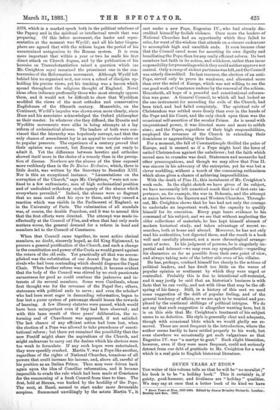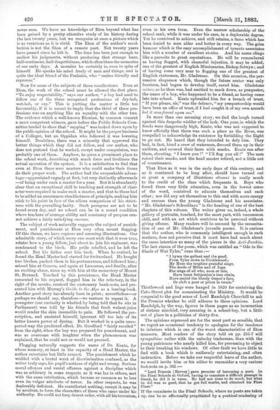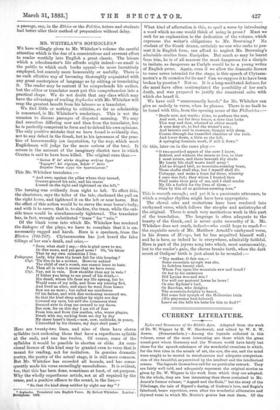SEVEN YEARS AT ETON.*
111B writer of this volume tells us that he will be "no moralist ;" his book is to be "a holiday book." This it certainly is, if gaiety, good-humour, and liveliness are " holiday " qualities. We may say at once that a better book of its kind we have • Seven Years at Bien, 1857.1864. Edited by Jame' Brinsley-Blebarde. London Bentley and Son. 1883.
never seen. We have no knowledge of Eton beyond what has been gained by a pretty attentive study of its history during the last twenty years, but we recognise at once a picture which is as veracious as it is vivid. The Eton of the author's recol- lection is not the Eton of a remote past. Not twenty years have passed since he left it. The time has been just enough to mellow his judgments, without producing that strange haze, half-sentiment, half-forgetfulness, which oftenblurs the memories of our early days. A moralist he certainly is, even in spite of himself. He speaks his mind freely of men and things, and is quite the ideal friend of the Psalmist, who "smites friendly and reproves."
Now for some of the subjects of these recollections. Even at Eton, the work of the school must be allowed the first place. "To enjoy respectability," says our author, "a boy had need to follow one of the three recognised professions of dry-bob, wet-bob, or sap." This is putting the matter a little too favourably, if it is meant to-imply that the third of these pro- fessions was on anything like an equality with the other two. The evidence which a well-known Etonian, by common consent a most competent witness, gave before the Public Schools Com- mittee tended to show that" sapping" was looked down upon by the public opinion of the school. It might be the proper business of a Colleg,er, but an Oppidan who followed it was lowering himself. Doubtless, there was a minority that approved the better things which they did not follow, and our author, who does not pretend that he worked, except under compulsion, was probably one of them. Anyhow, he gives a prominent place to the school work, describing with much force and liveliness the actual operation of the system. It is a satisfaction to find that even at Eton there were masters who could make their forms do their proper work. The author had the unspeakable advan- tage—appreciated vaguely at first, but very distinctly afterwards —of being tinder such a master for a year. But it is abundantly clear that an exceptional skill in teaching and strength of char- acter were required to make such a master, and that to these had to be added an uncommon steadfastness of principle, making him stick to his point in face of the odious comparison of his strict- ness with the prevailing laxity. Such paragons are not to be found every day, and no school can be in a sound condition where teachers of average ability and constancy of purpose can- not achieve a fairly satisfying success.
The subject of work naturally suggests the subject of punish- ment, and punishment at Eton very often meant flogging. Of this theme, we have copious and amusing illustrations. One admirable story, of which every one must wish that it were true, relates how a young fellow, just about to join his regiment, was condemned to the birch. His pride rebelled, and he left the school. But his father sent him back. When he arrived, he found the Head Master had started for Switzerland. He bought two birches, packed them in his portmanteau, and followed him ; missed him at Geneva, and again at Lausanne, and finally, after an exciting chase, came up with him at the monastery of Mount St. Bernard. Touched by this persistence, the Head Master consented to his request, flogged him in the refectory, in the sight of the monks, received the customary bank-note, and pre- sented him with Murray's Guide to the Alps as a leaving-book. Another good story has already been in print ; nevertheless—or perhaps we should say, therefore—we venture to repeat it. A youngster (our curiosity is whetted by being told that he sits in Parliament) was told by his friends that fresh walnut-juice would render the skin insensible to pain. He followed the pre- scription, and anointed himself, ignorant till too late of its better known power of dyeing. But it worked in a quite unex- pected way the predicted effect. Dr. Goodford "fairly recoiled" from the sight, when the boy was prepared for punishment, and was so overcome with laughter when the phenomenon was explained, that he could not or would not proceed.
Flogging naturally suggests the name of Dr. Keats, for whose memory, at least in the capacity of a Head Master, the author entertains but little respect. The punishment which he wielded with a brutal want of discrimination confused, as the writer truly says, his pupil's notions of right and wrong. Serious moral offences and venial offences against a discipline which was as arbitrary in some respects as it was lax in others, met -with the same retribution, which became so common as to lose even its vulgar attribute of terror. In other respects, he was deplorably deficient. He contributed nothing, except it may be by accident, to form the characters of those who came under his authority. He could not keep decent order, with all his terrorism,
even in his own form. Even the narrow scholarship of the school sank, while it was under his care, in a deplorable degree. Yet he contrived to achieve, and still retains, a fame which has been denied to men abler and better in every way. The grim humour which is the easy accomplishment of tyrants associates him with a number of excellent stories. And his name clings like a parasite to great reputations. He will be remembered as having flogged, with shameful injustice, it may be added,, one of the greatest of English Missionaries, Bishop Selwyn ; and of having come very near to flogging one of the greatest of English statesmen, Mr. Gladstone. On this occasion, the per- suasive eloquence which, though the future orator was only fourteen, had begun to develop itself, saved him. Gladstone
minor, as he then was, had omitted to mark down, as prwpostor,
the name of a boy, who happened to be a friend, as having come late into school. Keate upbraided him for a breach of trust. "If you please, sir," was the defence, "my praspostorship would have been an office of trust, if I had sought it of my own accord, but it was forced upon me."
In more than one amusing story, we find the laugh turned against this despotic wielder of the lash. One year, in which the floods were dangerously high, Keate, who was not supposed to know officially that there was such a place as the River, was compelled to acknowledge its existence by forbidding the Eight to go out. He heard that they intended to defy him. They had, in fact, hired a crew of watermen, dressed them up in their uniform, and covered their faces with masks. Keate ran after' them, shouting, "I know you!" "I'll flog you all1" The men raised their masks, and the head master retired, not a little out of countenance.
That Eton as it was in the early days of this century, and as it continued to be long after, should have turned out
so great a company of illustrious alumni is really much, to the credit of the class which frequents it. Boys who found there very little education, even in the lowest sense- of the word, contrived to educate themselves and each, other ; nor did any set themselves to this end with more energy
and success than the young Gladstone and his associates. "Mr. Gladstone's Schooldays" is the heading of one of the best chapters of this volume. The writer gives us, indeed, a whole gallery of portraits, touched, for the most part, with uncommon skill, and with an art which contrives to be personal without giving offence. Many readers will be amused by the resuscita,- tion of one of Mr. Gladstone's juvenile poems. It is curious that the author, who is commonly intelligent enough in such matters, does not perceive that it must have had much about
the same intention as many of the pieces in the Anti-Jacobin.
The last stanza of the poem, which was entitled an "Ode to the Shade of Wat Tyler," runs thus :—
"I hymn the gallant and the good, From Tyler down to Thistlewood ; My Muse the trophies grateful sings, The deeds of Miller and of Ings. She sings of all who, soon or late,
Have burst Subjection's iron chain, Have sealed the bloody despot's fate, Or cleft a peer or priest in twain."
Thistlewood and Ings were hanged in 1820 for contriving the Cato-Street plot for assassinating the Ministry. It would be' congenial to the good sense of Lord Randolph Churchill to ask the Premier whether he still adheres to these opinions. Lord Randolph, by the way, figures in these pages as an incarnation of riotous mischief, very amusing in a school-boy, but a little out of place in a politician of thirty-five.
The opinions expressed are for the most part so sensible, that we regret an occasional tendency to apologise for the insolence to inferiors which is one of the worst characteristics of Eton manners. Most readers of the story told on pp. 255-7 will sympathise rather with the unlucky tradesman, than with the young patricians who nearly killed him, for presuming to object to their breaking his windows. Of other fault we have little to find with a book which is uniformly entertaining, and often instructive. Before we take our respectful leave of the author, we would invite him or his editor to reconsider a very curious foot-note on p. 362 :—
"Lord Francis [Hervey] gave promise of becoming a poet. In. the Final Schools at Oxford, having to translate a difficult passage in Greek, he did it in verse. He had not -time to do mach, but what he did was so good, that he got full marks, and obtained his First Class."
If the examiners in the Final Schools, where no poets are taken up, can be so effectually propitiated by a poetical rendering of a passage, say, in the Ethics or the Politics, tutors and students had better alter their method of preparation without delay.




































 Previous page
Previous page